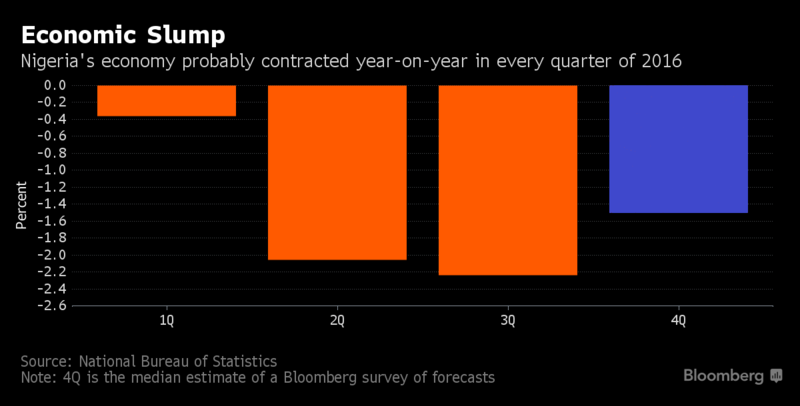It’s 4 p.m. in Nigeria’s capital and Ahmed Chiji has been running from car to car near the National Mosque selling mobile-phone airtime vouchers. His total for the day: 500 naira ($1.59).
That’s as little as a 20th of what he was selling at the beginning of last year before the economy, hit by falling crude oil prices, militant attacks on oil pipelines and foreign-exchange shortages, began contracting. Chiji, a 27-year-old high school dropout, says he can no longer make ends meet at a time when the inflation rate is at the highest in more than a decade.
“Government is asking us to be patient for them to do something,” Chiji said at an intersection in Abuja. “I think the worst is yet to come.”
The economic squeeze Chiji and millions of other Nigerians are feeling each day may be confirmed Tuesday when the statistics agency issues a report probably showing the economy contracted last year for the first time in a quarter century. It comes at a time of almost universally bad news for Africa’s most-populous nation. The unemployment rate has doubled, inflation is accelerating and President Muhammadu Buhari has been in London since Jan. 19 receiving treatment for an undisclosed medical condition. No one knows when he will return.
“It’s a foregone conclusion that the Nigerian economy went into a full-year contraction,” Manji Cheto, senior vice president at Teneo Intelligence in London, said by phone. “Ordinary Nigerians have been hit very badly.”
Budget Delay
Gross domestic product contracted year-on-year in the first three quarters of last year. The statistics agency report will probably show the economy shrank 1.5 percent in the last three months, according to the median estimate of nine economists surveyed by Bloomberg. The International Monetary Fund forecast a 1.5 percent contraction for 2016.
The 13.9 percent unemployment rate in the nation with 180 million people is the highest since at least 2010 and food prices rose 17.8 percent in January from a year earlier. Inflation has accelerated for the past 15 months, prompting the central bank to raise its key lending rate to a record high of 14 percent.
“Businesses and consumers are under considerable strain,” Yvonne Mhango, a Johannesburg-based economist at Renaissance Capital, said in an e-mailed response to questions. “Consumers who are still employed have seen their disposable income eroded by double-digit inflation, implying their purchasing power is falling.”
Prices of imports from food to gasoline climbed as the naira lost about 40 percent of its value against the dollar after the central bank removed a currency peg in June. The regulator continues to block importers of items it deems non-essential from the official foreign-exchange market, forcing them to buy dollars on the black market where the currency is about 30 percent more expensive.
The naira strengthened 1.2 percent to 310.95 against the dollar by 8:16 a.m. in Lagos, according to data compiled by Bloomberg. The currency closed at 440 per dollar on the black market on Friday, according to Abokifx.com.
Retailers of goods such as clothes and electronics increase prices even as demand drops, citing expensive dollars they need for imports. Obinna Isaac, who works in a shop that sells suits in the capital, said his boss hasn’t traveled to Turkey to buy stock, like he used to do, in months.
“People are no longer buying new suits to go to parties or job interviews,” Isaac said.
The government forecasts an increase in the price of oil and stability in the crude-producing Niger River delta will boost output and help the economy recover. Lawmakers are scheduled to approve the 2017 spending plans next month. This 7.3 trillion-naira budget will be 20 percent more than last year, with a deficit of 2.36 trillion naira.
Ultimately, Nigeria’s economic recovery “depends on how much they can do to reduce the deficit, how soon they can start rolling out the budget, and stability in the Niger Delta,” Teneo’s Cheto said.
Bloomberg

